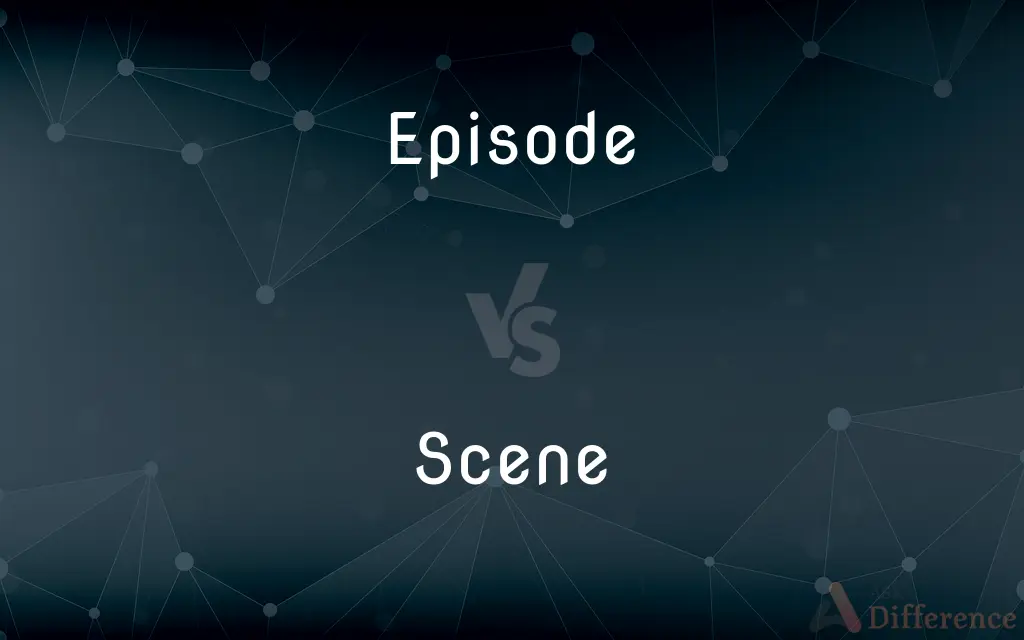Episode vs. Scene — What's the Difference?
By Urooj Arif & Maham Liaqat — Updated on March 19, 2024
An episode is a distinct segment within a series, containing a complete narrative arc, while a scene is a part of an episode or movie, marked by continuous action in a single setting.

Difference Between Episode and Scene
Table of Contents
ADVERTISEMENT
Key Differences
An episode is a self-contained part of a larger series, such as a TV show, podcast, or web series, often with its own story arc that contributes to the broader narrative. Each episode can vary in length but typically follows a structured format, providing a complete segment of storytelling that may or may not be directly connected to the events in other episodes. On the other hand, a scene is a smaller unit of storytelling within an episode or film, characterized by a specific setting and continuous action. Scenes are the building blocks of an episode, shifting from one location or set of actions to another to advance the plot or develop characters.
Episodes allow for the development of extended narratives and character arcs across a series, providing viewers with a sense of progression and depth. They enable writers and creators to explore various plotlines, themes, and character dynamics over time. Scenes, in contrast, are focused on delivering specific moments or pieces of the narrative, paying close attention to dialogue, setting, and character interaction. The transition from one scene to another is often marked by a change in location, time, or perspective, contributing to the rhythm and pace of the episode or film.
The relationship between episodes and scenes is hierarchical, with episodes composed of multiple scenes that together create a cohesive narrative experience. While an episode presents a broader story or theme, scenes offer detailed snapshots of the narrative, each contributing to the episode's overall arc and, by extension, to the series' storyline.
Episodes are a format more commonly associated with television and web series, allowing for episodic or serialized storytelling that can adapt over time to audience reactions and creative developments. Scenes, being fundamental to the structure of visual storytelling, are essential components of episodes, films, plays, and even books, defining the immediate context and action that drives the narrative forward.
Comparison Chart
Definition
A complete segment within a series, often with its own narrative arc.
A part of an episode or film marked by continuous action in a single setting.
ADVERTISEMENT
Narrative Scope
Contains a broader story or theme that contributes to the series arc.
Focuses on specific moments, interactions, or developments within the broader narrative.
Structure
Composed of multiple scenes.
A building block of an episode or film.
Length
Varies widely, typically longer, covering a full narrative segment.
Shorter, focused on immediate action or dialogue.
Function
Develops extended narratives, character arcs, and thematic exploration.
Advances the plot, develops characters, and sets the tone within the episode or film.
Compare with Definitions
Episode
A segment of a series with a self-contained narrative.
Each episode of the anthology series tells a unique story.
Scene
A sequence in a specific setting within an episode.
The opening scene set the tone for the entire episode.
Episode
An installment in a television series.
Fans eagerly awaited the season finale episode.
Scene
A continuous action or dialogue segment.
The dramatic scene between the characters was a highlight.
Episode
Part of a serialized story.
The latest episode revealed a major plot twist.
Scene
A moment that advances the narrative.
The scene at the diner revealed crucial information.
Episode
A chapter in a podcast or web series.
The podcast's newest episode explores unsolved mysteries.
Scene
A unit of action in storytelling.
Each scene contributed to building suspense.
Episode
A standalone story within a larger series.
This episode features a guest star playing a pivotal role.
Scene
A part of a film or play.
The final scene brought the story to a satisfying conclusion.
Episode
An episode is a narrative unit within a larger dramatic work or documentary production, such as a series intended for radio, television or on-line consumption. Episode derives from the Greek term (Ancient Greek: ἐπεισόδιον / epeisodion), meaning the material contained between two songs or odes in a Greek tragedy.
Scene
Something seen by a viewer; a view or prospect.
Episode
A separate part of a serialized work, such as a novel or television series.
Scene
The place where an action or event occurs
The scene of the crime.
Episode
A section of a classic Greek tragedy that occurs between two choric songs.
Scene
The place in which the action of a play, movie, novel, or other narrative occurs; a setting.
Episode
An incident or event that is part of a progression or a larger sequence
"one brief, if distressing, episode in a life rich in adventures, challenges, sorrows and joys" (Elizabeth Speller).
Scene
A subdivision of an act in a dramatic presentation in which the setting is fixed and the time continuous.
Episode
One of a series of events in the course of a narrative or drama.
Scene
A shot or series of shots in a movie constituting a unit of continuous related action.
Episode
(Music) A passage between statements of a main subject or theme, as in a rondo or fugue.
Scene
A section of a narrative in which the action is depicted through detail and dialogue as if it is occurring in real time
The editor felt the story had too much summary and suggested that the author add more scenes.
Episode
An incident, action, or time period standing out by itself, but more or less connected with a complete series of events.
It was a most embarrassing episode in my life.
Scene
The scenery and properties for a dramatic presentation.
Episode
An instalment of a drama told in parts, as in a TV series.
I can't wait till next week’s episode.
Scene
A theater stage.
Episode
A separate incident, story, or action, introduced for the purpose of giving a greater variety to the events related; an incidental narrative, or digression, separable from the main subject, but naturally arising from it.
Scene
A real or fictitious episode, especially when described.
Episode
A happening that is distinctive in a series of related events
Scene
A public display of passion or temper
Tried not to make a scene.
Episode
A brief section of a literary or dramatic work that forms part of a connected series
Scene
A sphere of activity
Observers of the political scene.
Episode
A part of a broadcast serial
Scene
(Slang) A situation or set of circumstances
A bad scene.
A wild scene.
Episode
Film consisting of a succession of related shots that develop a given subject in a movie
Scene
The location of an event that attracts attention.
The scene of the crime
Scene
The stage.
They stood in the centre of the scene.
Scene
(theatre) The decorations; furnishings and backgrounds of a stage, representing the place in which the action of a play is set
To paint scenes
To change the scenes
Behind the scenes
Scene
A part of a dramatic work that is set in the same place or time. In the theatre, generally a number of scenes constitute an act.
The play is divided into three acts, and in total twenty-five scenes.
The most moving scene is the final one, where he realizes he has wasted his whole life.
There were some very erotic scenes in the movie, although it was not classified as pornography.
Scene
The location, time, circumstances, etc., in which something occurs, or in which the action of a story, play, or the like, is set up
Scene
A combination of objects or events in view or happening at a given moment at a particular place.
He assessed the scene to check for any danger, and agreed it was safe.
They saw an angry scene outside the pub.
Scene
A landscape, or part of a landscape; scenery.
Scene
An exhibition of passionate or strong feeling before others, creating embarrassment or disruption; often, an artificial or affected action, or course of action, done for effect; a theatrical display
The headmistress told the students not to cause a scene.
The crazy lady made a scene in the grocery store.
Scene
An element of fiction writing.
Scene
A social environment consisting of an informal, vague group of people with a uniting interest; their sphere of activity; a subculture.
She got into the emo scene at an early age.
Scene
A youth subculture that was popular in Canada and the United States in the 2000s and early 2010s.
Scene
(transitive) To exhibit as a scene; to make a scene of; to display.
Scene
The structure on which a spectacle or play is exhibited; the part of a theater in which the acting is done, with its adjuncts and decorations; the stage.
Scene
The decorations and fittings of a stage, representing the place in which the action is supposed to go on; one of the slides, or other devices, used to give an appearance of reality to the action of a play; as, to paint scenes; to shift the scenes; to go behind the scenes.
Scene
So much of a play as passes without change of locality or time, or important change of character; hence, a subdivision of an act; a separate portion of a play, subordinate to the act, but differently determined in different plays; as, an act of four scenes.
My dismal scene I needs must act alone.
Scene
The place, time, circumstance, etc., in which anything occurs, or in which the action of a story, play, or the like, is laid; surroundings amid which anything is set before the imagination; place of occurrence, exhibition, or action.
The world is a vast scene of strife.
Scene
An assemblage of objects presented to the view at once; a series of actions and events exhibited in their connection; a spectacle; a show; an exhibition; a view.
Through what new scenes and changes must we pass!
Scene
A landscape, or part of a landscape; scenery.
A sylvan scene with various greens was drawn,Shades on the sides, and in the midst a lawn.
Scene
An exhibition of passionate or strong feeling before others; often, an artifical or affected action, or course of action, done for effect; a theatrical display.
Probably no lover of scenes would have had very long to wait for some explosions between parties, both equally ready to take offense, and careless of giving it.
Scene
To exhibit as a scene; to make a scene of; to display.
Scene
The place where some action occurs;
The police returned to the scene of the crime
Scene
An incident (real or imaginary);
Their parting was a sad scene
Scene
The visual percept of a region;
The most desirable feature of the park are the beautiful views
Scene
A consecutive series of pictures that constitutes a unit of action in a film
Scene
A situation treated as an observable object;
The political picture is favorable
The religious scene in England has changed in the last century
Scene
A subdivision of an act of a play;
The first act has three scenes
Scene
A display of bad temper;
He had a fit
She threw a tantrum
He made a scene
Scene
Graphic art consisting of the graphic or photographic representation of a visual percept;
He painted scenes from everyday life
Figure 2 shows photographic and schematic views of the equipment
Scene
The context and environment in which something is set;
The perfect setting for a ghost story
Scene
The painted structures of a stage set that are intended to suggest a particular locale;
They worked all night painting the scenery
Common Curiosities
Can an episode exist without scenes?
No, an episode is structured through scenes, which are essential for developing the narrative within the episode.
Do all episodes contribute to an overarching series plot?
Not necessarily. Some episodes, especially in procedural or anthology series, may have standalone plots, while others contribute to a larger, serialized storyline.
How long is a typical scene?
The length of a scene can vary greatly depending on its purpose in the narrative, but it's generally much shorter than an entire episode, lasting from a few seconds to several minutes.
Can a scene span multiple episodes?
While scenes typically occur within the confines of a single episode, certain narrative techniques, like cliffhangers, may leave a scene unresolved until the next episode.
Can a single episode consist of just one scene?
While unusual, some experimental or highly focused episodes might play out as a single, extended scene, often to create a specific artistic or narrative effect.
How do writers decide when to end a scene?
A scene usually ends when its purpose in the narrative has been fulfilled, such as completing a key conversation, exiting a specific location, or concluding an action sequence.
Can an entire movie be considered an episode?
In the context of a film series or saga, each movie might be considered an "episode" of the larger story, though this terminology is more commonly associated with TV and web series.
How does episodic storytelling differ from movies?
Episodic storytelling allows for more extensive character development, complex plots, and thematic exploration over time, unlike movies, which typically offer a condensed narrative within a single viewing.
How do scene transitions contribute to storytelling?
Scene transitions help to establish the pace, shift in time or location, and provide visual or auditory cues that guide the audience through the narrative.
Are episodes and scenes relevant in non-visual media?
While primarily associated with visual media, the concepts of episodes and scenes can also apply to written works and audio formats like podcasts, where they structure content and narrative progression.
Share Your Discovery

Previous Comparison
Vesicle vs. Papule
Next Comparison
Airport vs. AirparkAuthor Spotlight
Written by
Urooj ArifUrooj is a skilled content writer at Ask Difference, known for her exceptional ability to simplify complex topics into engaging and informative content. With a passion for research and a flair for clear, concise writing, she consistently delivers articles that resonate with our diverse audience.
Co-written by
Maham Liaqat













































